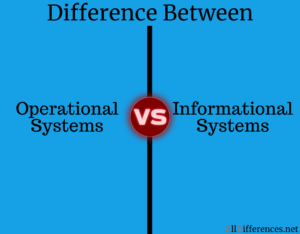Differences between Operational Systems and Informational Systems in Tabular Form
Contents
- Operational vs. Informational System Operational System. Operational systems maintain records of daily business transactions whereas a Data Warehouse is a special database that serves as the integrated repository of company data, for reporting and decision support purpose
- An Operational System (also called OLTP, for Online Transaction Processing) is typically optimized for quick inserts and updates, and lookups of single rows or a small collection of rows.
- An Information system is an organized system that affects the interplay between people, processes, and technology in an organization.
- Information systems are used all over the place. They are used by banks to manage their investments, hospitals to better care for their patients, and B2B companies to automate their marketing. Information systems are designed to improve the way people work, and take what they can do to a new level.

Comparison Chart
| Operational Systems | Informational Systems |
|---|---|
| Current Values are the Data Content | Data is Archived, Derived, Summarized |
| Data structure is Optimized for transactions | Data structure is Optimized for complex queries. |
| Access frequency is High | Access frequency is Medium to low |
| Data Access type is Read, Update, Delete | Data access type is only Read |
| Usage is Predictable, Repetitive | Usage is Ad hoc, Random, Heuristic |
| Response time is in Sub-seconds | Response time is in Several seconds to minutes |
| A large Number of users | A relatively small number of users |
Operational Systems
- Operational systems are tuned for known transactions and workloads, while the workload is not known a priori in a data warehouse.
- Special data organization, access methods, and implementation methods are needed to support data warehouse queries (typically multidimensional queries)
- E.g., the average amount spent on phone calls between 9 AM-5 PM in Pune during the month of December.
